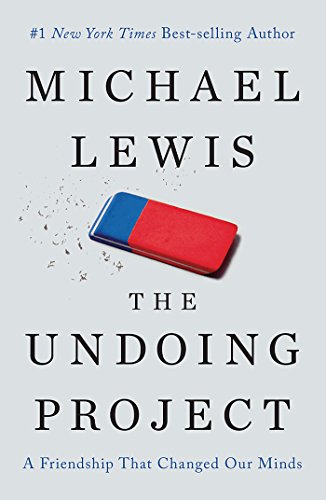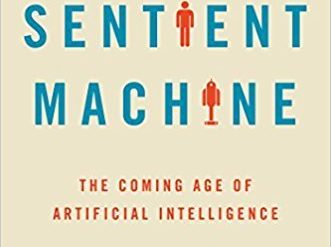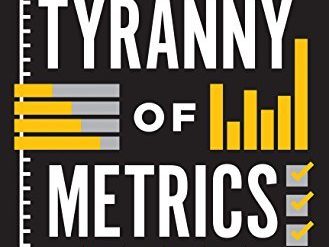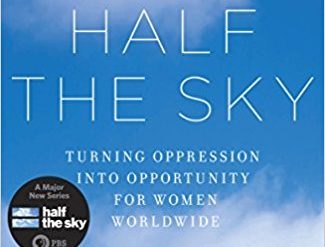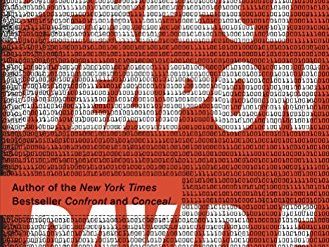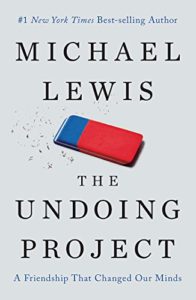
Estimated reading time: 5 minutes
Funny thing. Michael Lewis’ newest book, The Undoing Project, tells the story of two surpassingly brilliant Israeli psychologists whose work earned a Nobel prize in economics and, according to the subtitle, “Changed Our Minds.” As always, Lewis writes well, and he succeeds in blending biography and intellectual history with his usual skill. I greatly enjoyed the biographical details about the two Israelis and their eccentric, on-again, off-again relationship that Lewis likens to a marriage. They’re both endlessly fascinating characters. But I still don’t quite understand why their work gained a Nobel prize, much less how they changed my mind. I expected a little more from such a gifted author when writing about decision-making.
OK, I exaggerate. I gather that they — actually just Daniel Kahneman and not his late partner in crime, Amos Tversky — won the Nobel because they seem to have persuaded at least some economists that we humans are not rational animals. Ever since Adam Smith, most economists have insisted that our economic choices are rigorously determined by self-interest; so far as I know, most still do. For example, in a typical paper cited by Lewis, one economist wrote “‘The agent of economic theory is rational, selfish, and his tastes do not change.'” Which, of course, is sheer nonsense, as any sensible and halfway intelligent non-economist could have pointed out.
The Undoing Project: A Friendship That Changed Our Minds by Michael Lewis ★★★★☆
Kahneman and Tversky proved in a dozen different ways that people make irrational decisions much of the time, and not just in the field of economics. Working with economists, though, they demonstrated clearly that economic choices in particular are not necessarily logical. Their work led to the development of a new field of inquiry, behavioral economics. I suppose this is good (though I’ve long had my doubts about the wisdom of proliferating sub-specialties). But I see no evidence that economic policymakers today are making any better decisions than they did two or three decades ago. Much of Kahneman and Tversky’s seminal work was carried out in the 1970s and 80s; Kahneman took home the Nobel in 2002.
Now about changing our minds. Throughout The Undoing Project, Lewis describes the evolution of Kahneman and Tversky’s thinking — first, separately, and later after they forged a symbiotic intellectual partnership that lasted for decades with varying degrees of intensity. I found much of this hard to follow. I’ve never studied either psychology or philosophy, or found myself attracted to either field, for that matter. It’s obvious that both men were brilliant almost beyond compare. Perhaps Michael Lewis is, too. I’m not.
Despite Lewis’ valiant attempt to translate their thinking into simple English, I was frequently forced to re-read whole paragraphs, and even then often to little effect. On the other hand, many of their findings appeared to me to be simple common sense. And what did come through to me very clearly was the idea encapsulated in the title. Tversky and Kahneman focused on “undoing the mistakes of others.” My problem is that so many of those mistakes simply reflected lack of intelligence, stubbornness, poor judgment, sheer perversity, misplaced professional pride, or some combination of these failings.
“Idiocies commonly accepted as truths”
To cite one common-sense example: “Everywhere one turned, one found idiocies that were commonly accepted as truths only because they were embedded in a theory to which the scientists had yoked their careers.” OK. This is news? Scientists, including doctors, have been showing themselves to be poor at decision-making for centuries for just this reason. Another common-sense example: Kahneman and Tversky’s paper, “‘Belief in the Law of Small Numbers,’ teased out the implications of a single mental error that people commonly made — even when those people were trained statisticians.” In other words, people tend to draw conclusions from samples that are far too small. Sorry, but I didn’t need two psychologists to tell me that. I’ve been seeing examples all around me since I was a child.
Admittedly, Kahneman and Tversky — or, as was the case for decades before Tversky died, Tversky and Kahneman — had considerable impact on several fields. Lewis points to examples in medicine, professional basketball, federal social policy, and history as well as economics. Undoubtedly, these two men have made important contributions. They laid the intellectual foundation for the likes of the Oakland A’s Billy Beane as Lewis depicted him in Moneyball. I just wish I could understand how they changed my mind. Reading passages like the following doesn’t help: “When they made decisions, people did not seek to maximize utility. They sought to minimize regret.” Supposedly, then, when we make a decision, we’re trying to avoid feeling bad instead of gaining some advantage. Really?
I must admit that one of the pair’s discoveries impressed me greatly. Apparently, they invented the concept of framing. This I understand. It’s a big deal in cognitive science. Republicans have understood it for a very long time. Democrats are just starting to get the point. Too late, it seems.
For related reading
This is one of the many Good books by Berkeley authors.
You might also enjoy Science explained in 10 excellent popular books.
If you enjoy reading nonfiction in general, you might also enjoy:
- Great biographies I’ve reviewed: my 10 favorites
- My 10 favorite books about business history
- 20 top nonfiction books about history
And you can always find my most popular reviews, and the most recent ones, on the Home Page.

